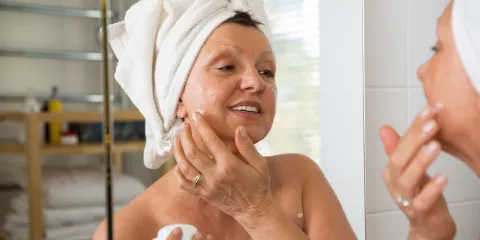
There’s more to living a healthy life than eating right and working out. Living “well” is a lifelong process and requires frequent check-ins and recalibrations. To help you discover where you’re thriving and where you’re facing challenges, we’ve developed a personal wellness assessment to help you examine 5 key areas of health: physical health, emotional wellbeing, social connections, personal development/career goals, and your physical environment. To take the assessment, download the PDF below and answer each question honestly. Then, read about the health benefits of each health area and discover ways you can live a more balanced life.
Improving Your Physical Wellbeing
When thinking about your physical wellbeing, most people’s minds tend to jump to exercising regularly and eating a balanced, nutrient-rich diet. However, physical health also encompasses sleeping enough, drinking enough water, protecting yourself from harmful UV rays, keeping track of important health numbers, like cholesterol, and supporting your heart by taking a heart-healthy supplement like Ubiquinol. If you scored low in the physical wellbeing category, pick one item you’d like to improve. It could be something simple, like drinking more water or talking to your doctor about taking a Ubiquinol supplement. If you choose something habit-based, like getting more physical activity, focus on that item for a few weeks before adding on something else. This approach will help you take manageable steps to improving your physical wellbeing and create long-term habits.
Growing Your Emotional Health
Working on your emotional health has many advantages, like developing higher self-esteem, feeling more energized, forming deeper relationships, and increasing your resilience to stress. Understanding your emotions is the first step to improving your emotional wellbeing. To improve in this area, consider practicing emotion regulation strategies like meditation and journaling, or talking with a therapist.
Strengthening Your Social Connections
Having a strong support system has short- and long-term health benefits. Adults who have strong social connections are generally healthier and live longer than those who are more isolated. In addition, high-quality social support can make you more resilient to stress and trauma-induced disorders like PTSD. As we age, maintaining or forming tight relationships may help protect you from cognitive decline. To grow your social connections, make a weekly or daily goal to reach out to a friend or family member. It doesn’t have to be in person - even reconnecting with your loved ones over the phone is a big step in forming closer relationships.
Setting Personal Development & Career Goals
Life moves fast, and between work obligations and making time for friends and family, it can be easy to set your personal goals aside. Taking time to set your goals and make progress towards them can help you feel fulfilled and inspired. If you want to improve in this area, carve out some time to think about your short- and long-term goals. Then, plan how you’ll reach those goals one step at a time. Whether it’s scheduling time with your family or harnessing your creativity into a passion project, making time to learn new things and flex your skills can help your life feel balanced and full.
Improving Your Physical Environment
The practice of feng shui has been around for hundreds of years, and for good reason. According to the practice’s principles, your living space should align with who you are and what you want. By clearing your space of clutter and surrounding yourself with things that bring you joy, your home can become more peaceful and welcoming. Plus, making it a habit to regularly clean and clear clutter can remove bacteria, allergens, dust, and irritants. To make your physical space more inviting, start small. Try to spend 30 minutes each day decluttering or cleaning an area. If you don’t have enough time, try just 10 or 15 minutes. By making small progress each day, you’ll be well on your way to creating a home that reflects the true you.
Living a balanced life is a marathon, not a sprint. If there are lots of areas you want to work on, avoid the urge to try everything at once. Focusing on a few goals at a time ensures you won’t get overwhelmed and helps you create positive long-term habits. After a few months, come back and take this assessment again. You’ll be able to compare your results, see where you’ve made the most progress, and set new goals.
2 https://www.ncbi.nlm.nih.gov/pmc/articles/PMC1114432/
3 https://www.ncbi.nlm.nih.gov/pmc/articles/PMC3150158/
4 https://www.ncbi.nlm.nih.gov/pmc/articles/PMC2921311/
5 https://www.health.harvard.edu/mind-and-mood/protecting-against-cognitive-decline
6 https://www.ncbi.nlm.nih.gov/pmc/articles/PMC5039914/












